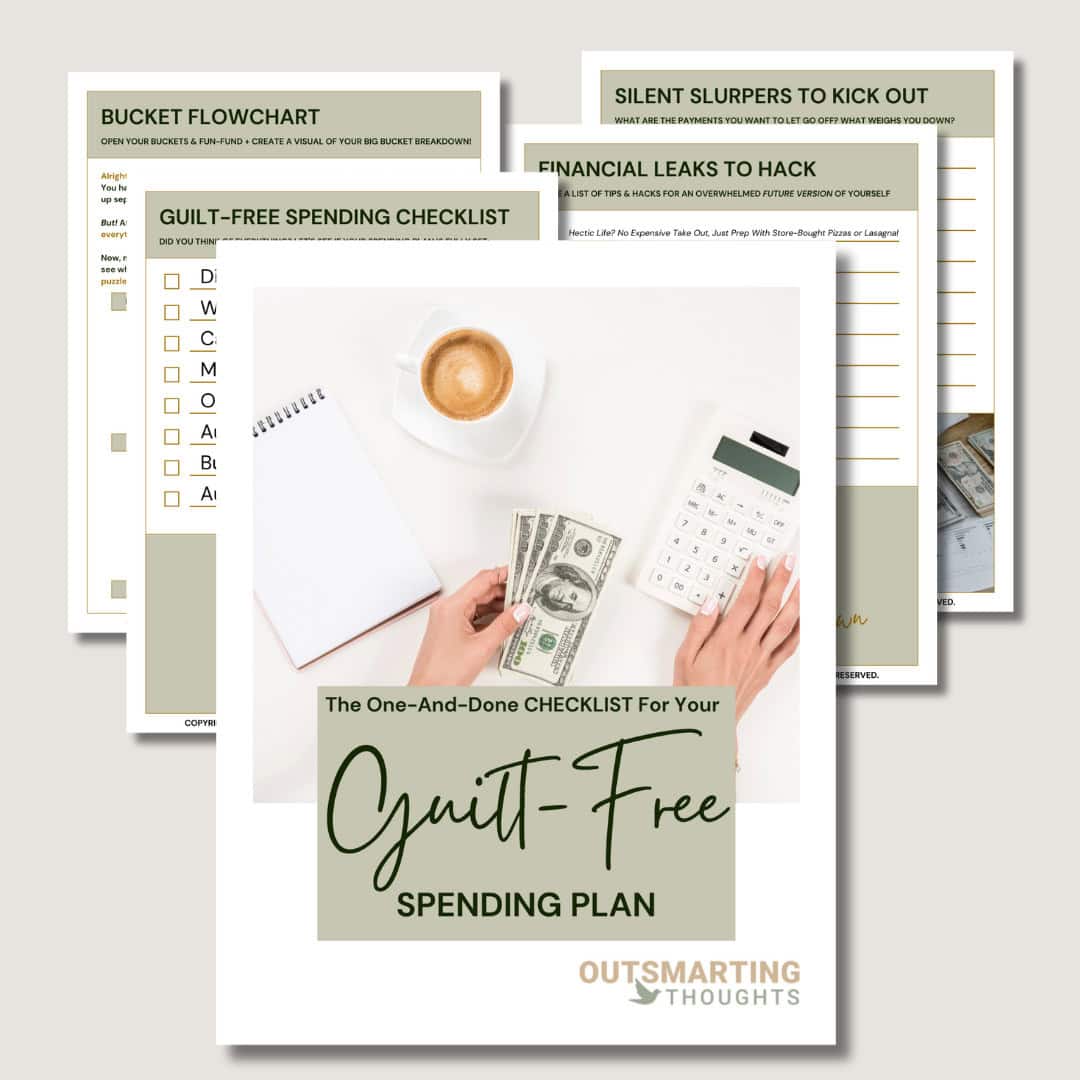Wanna know why buying impulsively keeps wrecking your wallet while overspending feels like a slow-motion car crash you could’ve seen coming? This post is dedicated to showing you the hidden difference between the two, why you’re not to blame for falling into either trap, and how to reclaim control.
You know that sinking gut-punch after clicking buy now? Or the shame spiral when you realize your bank account is bleeding out because you planned to spend ‘just a little more’? Buying impulsively and overspending both feel like personal failures, but they’re actually the direct result of a consumer culture designed to trip you up everywhere. And let’s not sugarcoat it: mass marketing masterminds have turned your brain into their playground.
What you’re going to learn is how overspending is based on wishful thinking, while buying impulsively is purely reactive. You’ll also discover how financial denial sneaks in to keep you stuck and why both habits collapse when you don’t have systems in place to protect yourself.
After you have learned to see the patterns for what they are, you will be able to set up intentional spending strategies, stop being easy prey for marketers, and actually feel more kick-ass confidence in the way you handle money. That empowerment means you’re no longer half-assing life, and instead fully stepping into self-actualization territory.
This post is all about buying impulsively vs overspending, so you can stop playing small and start living strategically.
Buying Impulsively
The psychology behind buying impulsively is that you’ve been taught to scapegoat yourself as the problem for your financial turbulence, ignoring the fact that consumer culture tempts you everywhere. On top of that, you confuse doing something bad with being bad. Overspending and impulse buying are misaligned actions, but your pride twists them into a reflection of who you are. And sadly, that judgment keeps you emotionally stuck.
What it truly is about is recognizing these actions for what they are: temporary slips caused by either reactivity or wishful thinking. Blame, shame, and guilt will only delay your progress. Once you restore your innocence, set up the right environment, and make intentional choices, you’ll find it almost impossible not to level up. You are a normal, decent, feeling human being, and you deserve strategies that work for you, not against you.
Overspending Is Wishful Thinking, Impulse Buying Is Reactive
Excuse me being frank, but I absolutely resent wishful thinking; and this is, wishful thinking! Overspending is built on fantasies: I’ll feel better if I buy this, I deserve this because I had a rough week, or the classic I’ll pay it back later when I earn more. That’s not rational; it’s your brain trying to predict a brighter tomorrow through your wallet. Overspending always hides behind a hope-shaped curtain. It whispers about a future where you magically have more discipline or money, and that’s how it sells you a lie.
Buying impulsively, on the other hand, isn’t thinking at all. It’s reactive. It’s your environment poking your dopamine button like a lab rat experiment. One flashy ‘limited time only’ sign and boom; you’re throwing money like you’re hypnotized. While overspending is based on hope, impulse buying is basically your brain skipping thought altogether.
Financial denial always slips in here, too. You tell yourself this one time won’t matter, or I’ll deal with it later. Denial lets both habits thrive by convincing you that avoiding reality will somehow fix it. Spoiler: it never does.
RELATED POST:
How To Pull Yourself Out Of Financial Denial: An Overachiever’s Strategy To Get Back In Control
Pause & analyze the situation; overspending gives you the illusion of control through planning, while impulsive buying rips control right out of your hands. Both keep you off-balance, spinning in a cycle of shame, and both distract you from your bigger financial goals. But the good news is; once you name them for what they are (wishful thinking vs reactivity) you can finally see the pattern clearly and start dismantling it. So let’s do just that!
Both Are Misaligned Money Strategies That Make You Easy Prey
Let’s move past fluff & flaky wishful thinking: both overspending and buying impulsively are failing strategies. They don’t make you reckless; they make you unprotected. Without systems to keep you grounded, you’re basically at the mercy of every environment you step into. That’s why a walk through the mall, a scroll through Instagram, or even standing in line at the grocery store can ambush you. Your willpower doesn’t stand a chance against billion-dollar marketing teams engineering triggers that hit your brain like crack.
Sorry for not sugarcoating, but marketers see you as easy prey. They want you reacting, not thinking. They thrive on you chasing dopamine instead of goals. Overspending, on the other hand, makes you an even juicier target because you’ve already loosened your guard with wishful thinking.
When you recognize that both habits are misaligned strategies, you’ll realize self-control isn’t about white-knuckling it. It’s about setting up better systems. Without those, you’re walking into a war zone unarmed.
Owning a cashflow strategy is a skill that’ll give you some serious advantages in life. I think budgeting is an aligned action with taking life seriously, and I seriously believe life will reward you for it. If you’re not into high-maintenance strategies like ‘tracking your spending’ and just want to sit down ONCE to direct your financial future, our Guilt-Free Spending Plan Printable is the right cashflow strategy for you! Don’t let anybody outsmart you out of your own money and start budgeting today by simply filling out the form below:

Want a free
ONE-AND-DONE CHECKLIST for aGUILT-FREE SPENDING PLAN? Free up your bandwidth and stop overthinking with this
FREE One-And-Done Checklist for your Guilt-Free Spending Plan!
Simply fill out the form below to get this strategy
delivered straight to your inbox!
If You Don’t Take Money Management Seriously, Someone Else Will Control You
Can I shake you awake a little right now? If you don’t start managing money with intention, someone else will gladly do it for you. When you overspend or buy impulsively, you hand over control not just to stores and marketers but eventually to banks, debt collectors, and government agencies. And believe me, you do not want institutions to have that level of power over your life.
Both overspending and impulse buying make you a passenger in your own financial car. You get driven wherever the environment pushes, and your financial future shrinks into survival mode. That’s not the life you deserve. What you need is intentional spending: making conscious choices where your money goes and designing systems that put you in the driver’s seat.
RELATED POST:
Intentional Spending: The CEO-Mindset And AntiDote Against Overspending & Impulse Buying
Pause for a second and picture this. Wouldn’t you rather tell your money where to work instead of cleaning up chaos month after month? Intentional spending isn’t about cutting all joy. It’s about aligning your spending with what resonates with you.
What it truly is about is protecting yourself from outside control. Because once you commit to intentional spending, the game flips. You stop being prey and start being the strategist. That’s when you step into full potential and refuse to half-ass life.
Forgive Yourself, Don’t Punish Yourself
Here’s the sad but true reality: you’re going to mess up again. Buying impulsively or overspending won’t magically disappear overnight. But forgiveness can absolutely be your secret weapon. I know that sounds cheezy, but it’s actually scientifically backed up. Care is way better for your mental health and your learning curve than punishment ever will be. When you punish yourself with guilt and shame, you’re literally wiring your brain to stay in fight-or-flight mode.
Seriously, scientific evidence backs this up. Studies in behavioral psychology show that punishment increases stress hormones, which actually make impulsive decisions more likely. Research on self-compassion by Dr. Kristin Neff highlights that people who treat themselves kindly after setbacks show higher resilience, better long-term progress, and stronger financial decision-making capacity. In fact, forgiveness quiets down the threat system in your brain so you can think strategically instead of reactively.
So instead of berating yourself for buying the sneakers or overspending on that dinner, practice care. Say: I slipped, but I’m still a normal, decent, feeling human being who’s learning systems that will protect me next time.
Punishment is toxic; it chains you to the very behavior you’re trying to escape. Forgiveness, on the other hand, frees you up to build intentional habits. Every slip is another repetition in training your brain. With care, you level up. With punishment, you stall.
Buying Impulsively (Summary)
The psychology behind buying impulsively is that consumer culture sets traps everywhere, and you blame yourself instead of recognizing how engineered the system is. Overspending piles on by twisting your pride, convincing you that doing something bad equals being bad. That self-judgment creates more chaos than the original slip.
The strategies from this post are simple but powerful: recognize overspending as wishful thinking and impulse buying as reactive. Stop giving your environment the upper hand, build systems that shield you, and embrace intentional spending so you can call the shots instead of institutions.
Imagine the future you stepping out of survival mode into full financial strategy mode. No more being prey, no more half-assing life. You’re in control, fully aligned, and living with kick-ass confidence because you’ve finally flipped the script on money.
I wish you the absolute best as you step into that power. Go grab life by the horns; you’ve got this.
This post was all about buying impulsively vs overspending, so you can stop playing small and start living strategically.
We aim to help you out as much as possible, but please keep in mind that the content is only for general informational and educational purposes. We offer our services based on independent research and life-experience only, and so our strategies can never serve as a substitute for professional advice. Trust me, we do not have 'everything figured out', are all still huge works in progress, but hey, what works for us, might work for you too! This is allll up for you to decide... It might not work for you, and that's okay, so cherrypick the stuff that resonates and leave the stuff that doesn't, and let's go!








